英语语法_如何把直接引语转换为间接引语
- 格式:doc
- 大小:41.50 KB
- 文档页数:5
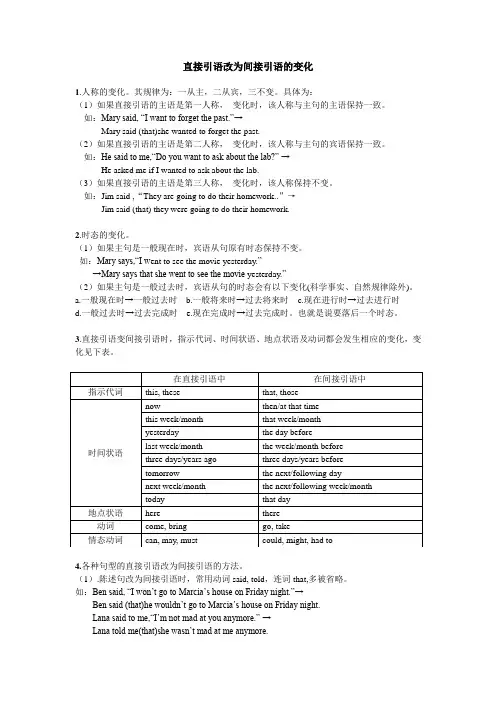
直接引语改为间接引语的变化1.人称的变化。
其规律为:一从主,二从宾,三不变。
具体为:(1)如果直接引语的主语是第一人称,变化时,该人称与主句的主语保持一致。
如:Mary said, “I want to forget the past.”→Mary said (that)she wanted to forget the past.(2)如果直接引语的主语是第二人称,变化时,该人称与主句的宾语保持一致。
如:He said to me,“Do you want to ask about the lab?” →He asked me if I wanted to ask about the lab.(3)如果直接引语的主语是第三人称,变化时,该人称保持不变。
如:Jim said ,“They are going to do their homework..”→Jim said (that) they were going to do their homework.2.时态的变化。
(1)如果主句是一般现在时,宾语从句原有时态保持不变。
如:Mary says,“I w ent to see the movie yesterday.”→Mary says that she went to see the movie yesterday.”(2)如果主句是一般过去时,宾语从句的时态会有以下变化(科学事实、自然规律除外)。
a.一般现在时→一般过去时b.一般将来时→过去将来时c.现在进行时→过去进行时d.一般过去时→过去完成时e.现在完成时→过去完成时。
也就是说要落后一个时态。
3.直接引语变间接引语时,指示代词、时间状语、地点状语及动词都会发生相应的变化,变化见下表。
4.各种句型的直接引语改为间接引语的方法。
(1).陈述句改为间接引语时,常用动词said, told,连词that,多被省略。
如:Ben said, “I won’t go to Marcia’s house on Friday night.”→Ben said (that)he wouldn’t go to Marcia’s house on Friday night.Lana said to me,“I’m not mad at you anymore.” →Lana told me(that)she wasn’t mad at me anymore.(2).一般疑问句常用if或whether来将其改为间接引语(选择疑问句只能用whether),常用ask来引述,可以加间接宾语。
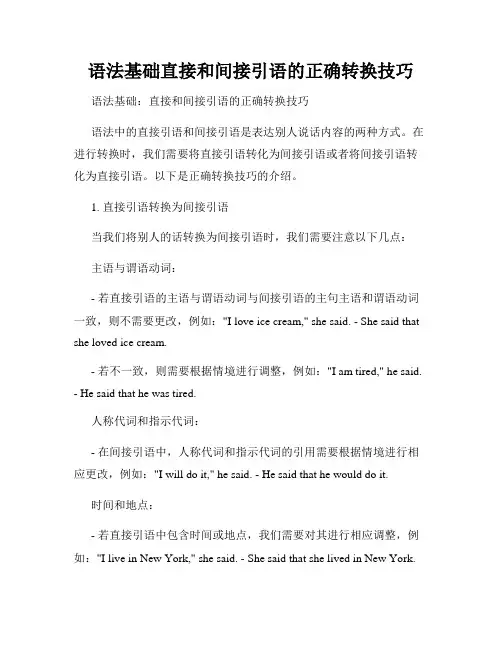
语法基础直接和间接引语的正确转换技巧语法基础:直接和间接引语的正确转换技巧语法中的直接引语和间接引语是表达别人说话内容的两种方式。
在进行转换时,我们需要将直接引语转化为间接引语或者将间接引语转化为直接引语。
以下是正确转换技巧的介绍。
1. 直接引语转换为间接引语当我们将别人的话转换为间接引语时,我们需要注意以下几点:主语与谓语动词:- 若直接引语的主语与谓语动词与间接引语的主句主语和谓语动词一致,则不需要更改,例如:"I love ice cream," she said. - She said that she loved ice cream.- 若不一致,则需要根据情境进行调整,例如:"I am tired," he said. - He said that he was tired.人称代词和指示代词:- 在间接引语中,人称代词和指示代词的引用需要根据情境进行相应更改,例如:"I will do it," he said. - He said that he would do it.时间和地点:- 若直接引语中包含时间或地点,我们需要对其进行相应调整,例如:"I live in New York," she said. - She said that she lived in New York.- 若间接引语地点与发言者所在地不同,则需要相应调整,例如:"I am here," she said. - She said that she was there.2. 间接引语转换为直接引语将间接引语转换为直接引语能够更加准确地表达原本的说话者的意思,转换时需要注意以下几点:去除引导词:- 首先,我们需要去除引导词,例如:"She said that she was busy." - "I am busy."主语和谓语动词:- 若间接引语中的主语与谓语动词与直接引语的主句主语和谓语动词一致,则不需要更改,例如:"He said that he loves ice cream." - "Ilove ice cream."- 若不一致,则需要根据情境进行调整,例如:"He said that he was tired." - "I am tired."人称代词和指示代词:- 在直接引语中,人称代词和指示代词的使用需要根据情境进行相应更改,例如:"She said that she would do it." - "I will do it."时间和地点:- 若间接引语中包含时间或地点,我们需要根据情境进行相应调整,例如:"She said that she lived in New York." - "I live in New York."以上是直接引语和间接引语的正确转换技巧。
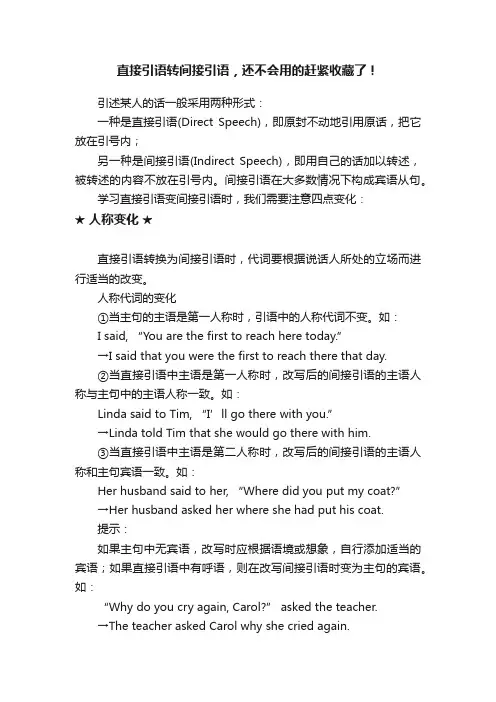
直接引语转间接引语,还不会用的赶紧收藏了!引述某人的话一般采用两种形式:一种是直接引语(Direct Speech),即原封不动地引用原话,把它放在引号内;另一种是间接引语(Indirect Speech),即用自己的话加以转述,被转述的内容不放在引号内。
间接引语在大多数情况下构成宾语从句。
学习直接引语变间接引语时,我们需要注意四点变化:★ 人称变化★直接引语转换为间接引语时,代词要根据说话人所处的立场而进行适当的改变。
人称代词的变化①当主句的主语是第一人称时,引语中的人称代词不变。
如:I said, “You are the first to reach here today.”→I said that you were the first to reach there that day.②当直接引语中主语是第一人称时,改写后的间接引语的主语人称与主句中的主语人称一致。
如:Linda said to Tim, “I’ll go there with you.”→Linda told Tim that she would go there with him.③当直接引语中主语是第二人称时,改写后的间接引语的主语人称和主句宾语一致。
如:Her husband said to her, “Where did you put my coat?”→Her husband asked her where she had put his coat.提示:如果主句中无宾语,改写时应根据语境或想象,自行添加适当的宾语;如果直接引语中有呼语,则在改写间接引语时变为主句的宾语。
如:“Why do you cry again, Carol?” asked the teacher.→The teacher asked Carol why she cried again.④当直接引语中主语是第三人称时,改写时不发生变化。
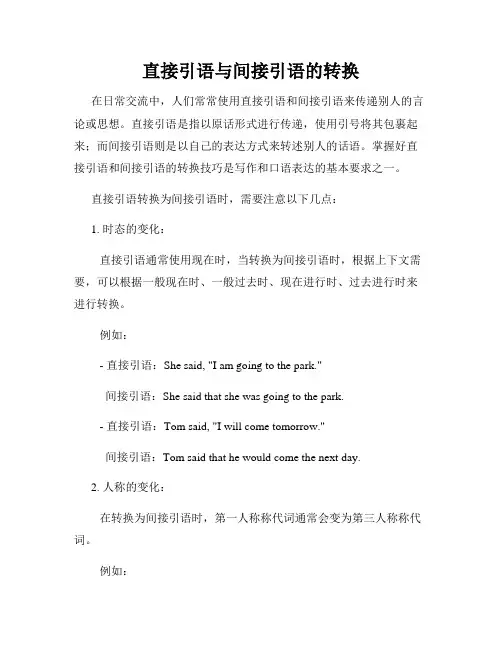
直接引语与间接引语的转换在日常交流中,人们常常使用直接引语和间接引语来传递别人的言论或思想。
直接引语是指以原话形式进行传递,使用引号将其包裹起来;而间接引语则是以自己的表达方式来转述别人的话语。
掌握好直接引语和间接引语的转换技巧是写作和口语表达的基本要求之一。
直接引语转换为间接引语时,需要注意以下几点:1. 时态的变化:直接引语通常使用现在时,当转换为间接引语时,根据上下文需要,可以根据一般现在时、一般过去时、现在进行时、过去进行时来进行转换。
例如:- 直接引语:She said, "I am going to the park."间接引语:She said that she was going to the park.- 直接引语:Tom said, "I will come tomorrow."间接引语:Tom said that he would come the next day.2. 人称的变化:在转换为间接引语时,第一人称称代词通常会变为第三人称称代词。
例如:- 直接引语:John said, "I am happy."间接引语:John said that he was happy.3. 时间和地点的变化:当直接引语中涉及到具体的时间和地点时,在转换为间接引语时需相应地变化。
例如:- 直接引语:Mary said, "I will meet you here at 5 pm."间接引语:Mary said that she would meet me there at 5 pm.4. 情态动词的变化:当直接引语中含有情态动词时,需要根据情况进行相应的转换。
例如:- 直接引语:He said, "I can swim."间接引语:He said that he could swim.- 直接引语:She said, "I must leave now."间接引语:She said that she had to leave then.除了上述常用的转换规则,还有一些特殊情况需要注意。
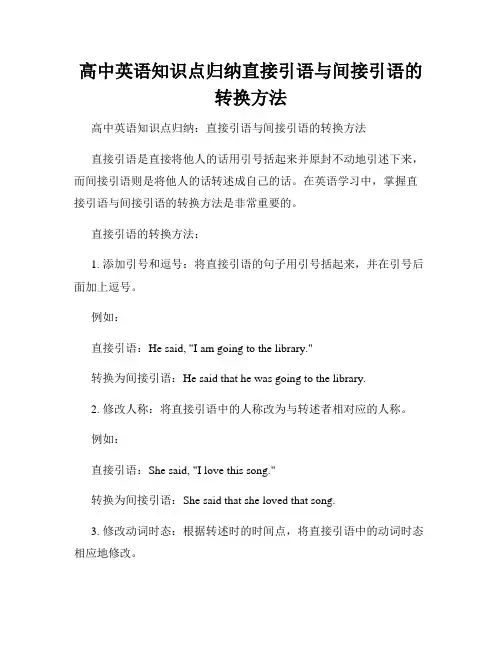
高中英语知识点归纳直接引语与间接引语的转换方法高中英语知识点归纳:直接引语与间接引语的转换方法直接引语是直接将他人的话用引号括起来并原封不动地引述下来,而间接引语则是将他人的话转述成自己的话。
在英语学习中,掌握直接引语与间接引语的转换方法是非常重要的。
直接引语的转换方法:1. 添加引号和逗号:将直接引语的句子用引号括起来,并在引号后面加上逗号。
例如:直接引语:He said, "I am going to the library."转换为间接引语:He said that he was going to the library.2. 修改人称:将直接引语中的人称改为与转述者相对应的人称。
例如:直接引语:She said, "I love this song."转换为间接引语:She said that she loved that song.3. 修改动词时态:根据转述时的时间点,将直接引语中的动词时态相应地修改。
例如:直接引语:He said, "I will visit my grandparents next week."转换为间接引语:He said that he would visit his grandparents the following week.4. 修改时间状语:将直接引语中的时间状语根据转述时的具体情况进行修改。
例如:直接引语:She said, "I saw him yesterday."转换为间接引语:She said that she had seen him the day before.间接引语的转换方法:1. 去除引号和逗号:去除直接引语中的引号和逗号。
例如:间接引语:She said that she loved that song.2. 恢复原人称:根据直接引语的原人称,将间接引语中的人称恢复到原来的形式。
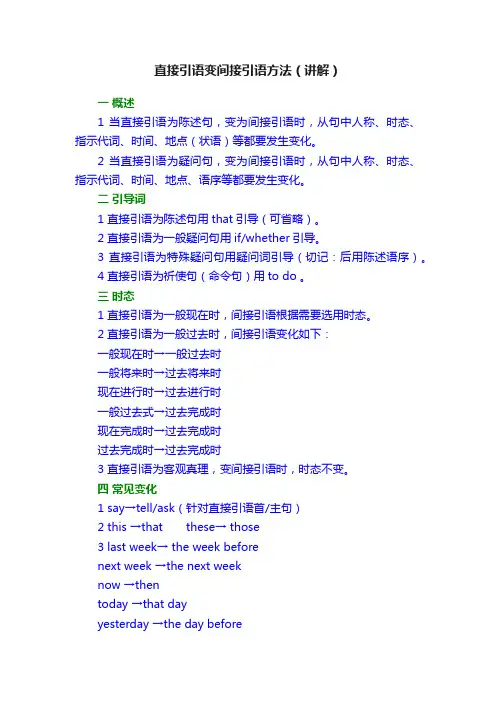
直接引语变间接引语方法(讲解)一概述1 当直接引语为陈述句,变为间接引语时,从句中人称、时态、指示代词、时间、地点(状语)等都要发生变化。
2 当直接引语为疑问句,变为间接引语时,从句中人称、时态、指示代词、时间、地点、语序等都要发生变化。
二引导词1 直接引语为陈述句用that引导(可省略)。
2 直接引语为一般疑问句用if/whether引导。
3 直接引语为特殊疑问句用疑问词引导(切记:后用陈述语序)。
4 直接引语为祈使句(命令句)用to do 。
三时态1 直接引语为一般现在时,间接引语根据需要选用时态。
2 直接引语为一般过去时,间接引语变化如下:一般现在时→一般过去时一般将来时→过去将来时现在进行时→过去进行时一般过去式→过去完成时现在完成时→过去完成时过去完成时→过去完成时3 直接引语为客观真理,变间接引语时,时态不变。
四常见变化1 say→tell/ask(针对直接引语首/主句)2 this →that these→ those3 last week→ the week beforenext week →the next weeknow →thentoday →that dayyesterday →the day beforetomorrow →the next daya day ago →a day before4 here →there5 come →go巩固练习(按顺序编排):1 She said,"I have to say goodbye now."2 She said to us,"It may snow tonight."3 " I bought the glasses yesterday," She said to me.4 "Is your mother a doctor ?" She asked Lily.5 She asked " Where is Linda ?"6 " Who has brought you to the hospital?" the nurse asked the girl.7 " Please read ten pages today," the teacher said to the students.8 The teacher said to us, " The earth travels around the sun."9 He said, " I was a soldier in 2008." (注意此题)参考答案:1 She said she had to say goodbye then.2 She told us it might snow that night.3 She told me she had bought the glasses the day before.4 she asked Lily if her mother was a doctor.5 She asked where Linda was.6 The nurse asked the girl who had brought her to the hospital.7 The teacher told the students to read 10 pages that day.8 The teacher told us the earth travels around the sun.9 He said he was a soldier in 2008.。
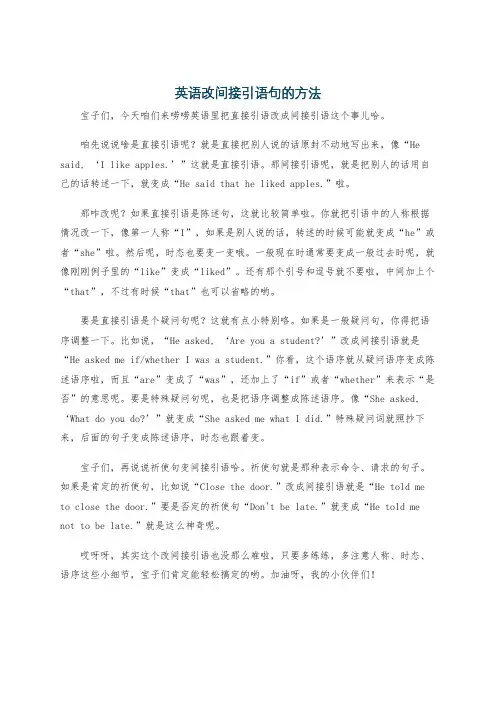
英语改间接引语句的方法宝子们,今天咱们来唠唠英语里把直接引语改成间接引语这个事儿哈。
咱先说说啥是直接引语呢?就是直接把别人说的话原封不动地写出来,像“He said, ‘I like apples.’”这就是直接引语。
那间接引语呢,就是把别人的话用自己的话转述一下,就变成“He said that he liked apples.”啦。
那咋改呢?如果直接引语是陈述句,这就比较简单啦。
你就把引语中的人称根据情况改一下,像第一人称“I”,如果是别人说的话,转述的时候可能就变成“he”或者“she”啦。
然后呢,时态也要变一变哦。
一般现在时通常要变成一般过去时呢,就像刚刚例子里的“like”变成“liked”。
还有那个引号和逗号就不要啦,中间加上个“that”,不过有时候“that”也可以省略的哟。
要是直接引语是个疑问句呢?这就有点小特别咯。
如果是一般疑问句,你得把语序调整一下。
比如说,“He asked, ‘Are you a student?’”改成间接引语就是“He asked me if/whether I was a student.”你看,这个语序就从疑问语序变成陈述语序啦,而且“are”变成了“was”,还加上了“if”或者“whether”来表示“是否”的意思呢。
要是特殊疑问句呢,也是把语序调整成陈述语序。
像“She asked, ‘What do you do?’”就变成“She asked me what I did.”特殊疑问词就照抄下来,后面的句子变成陈述语序,时态也跟着变。
宝子们,再说说祈使句变间接引语哈。
祈使句就是那种表示命令、请求的句子。
如果是肯定的祈使句,比如说“Close the door.”改成间接引语就是“He told me to close the door.”要是否定的祈使句“Don't be late.”就变成“He told me not to be late.”就是这么神奇呢。
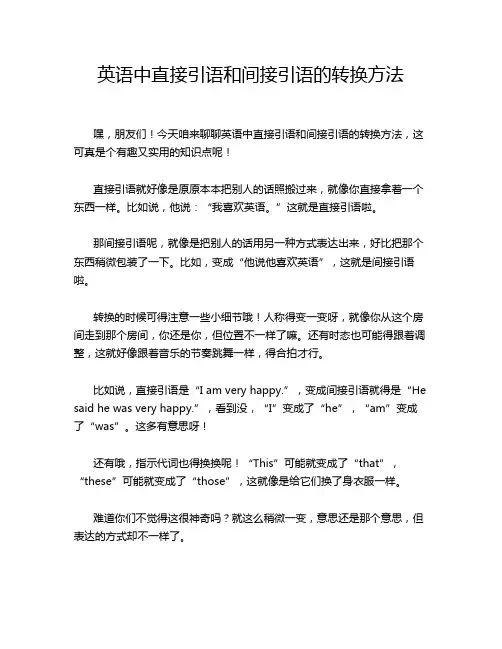
英语中直接引语和间接引语的转换方法
嘿,朋友们!今天咱来聊聊英语中直接引语和间接引语的转换方法,这可真是个有趣又实用的知识点呢!
直接引语就好像是原原本本把别人的话照搬过来,就像你直接拿着一个东西一样。
比如说,他说:“我喜欢英语。
”这就是直接引语啦。
那间接引语呢,就像是把别人的话用另一种方式表达出来,好比把那个东西稍微包装了一下。
比如,变成“他说他喜欢英语”,这就是间接引语啦。
转换的时候可得注意一些小细节哦!人称得变一变呀,就像你从这个房间走到那个房间,你还是你,但位置不一样了嘛。
还有时态也可能得跟着调整,这就好像跟着音乐的节奏跳舞一样,得合拍才行。
比如说,直接引语是“I am very happy.”,变成间接引语就得是“He said he was very happy.”,看到没,“I”变成了“he”,“am”变成了“was”。
这多有意思呀!
还有哦,指示代词也得换换呢!“This”可能就变成了“that”,“these”可能就变成了“those”,这就像是给它们换了身衣服一样。
难道你们不觉得这很神奇吗?就这么稍微一变,意思还是那个意思,但表达的方式却不一样了。
这就好像魔术师变魔术一样,把一样东西变个样子呈现出来,却还是那个东西的本质。
我们学英语不就是这样嘛,不断地去探索这些奇妙的变化,让我们的英语变得更加丰富多彩。
所以呀,大家一定要好好掌握这个转换方法,它会让你的英语更加地道,更加生动呢!这绝对不是什么难事,只要多练习,多尝试,肯定能轻松搞定的啦!加油吧,朋友们!让我们在英语的海洋里畅游,享受这种转换带来的乐趣和成就感!。
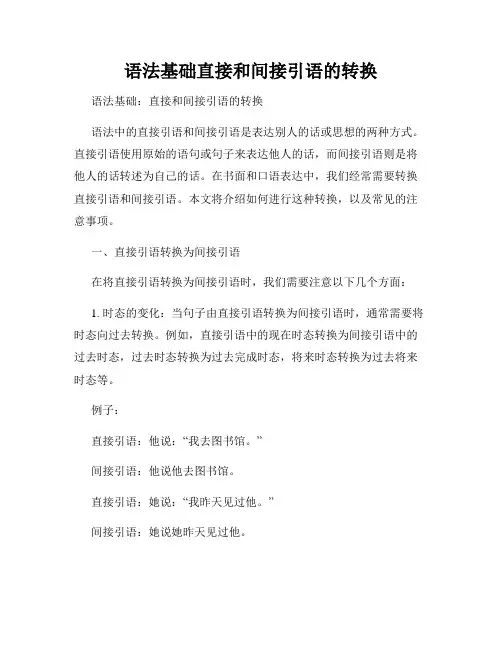
语法基础直接和间接引语的转换语法基础:直接和间接引语的转换语法中的直接引语和间接引语是表达别人的话或思想的两种方式。
直接引语使用原始的语句或句子来表达他人的话,而间接引语则是将他人的话转述为自己的话。
在书面和口语表达中,我们经常需要转换直接引语和间接引语。
本文将介绍如何进行这种转换,以及常见的注意事项。
一、直接引语转换为间接引语在将直接引语转换为间接引语时,我们需要注意以下几个方面:1. 时态的变化:当句子由直接引语转换为间接引语时,通常需要将时态向过去转换。
例如,直接引语中的现在时态转换为间接引语中的过去时态,过去时态转换为过去完成时态,将来时态转换为过去将来时态等。
例子:直接引语:他说:“我去图书馆。
”间接引语:他说他去图书馆。
直接引语:她说:“我昨天见过他。
”间接引语:她说她昨天见过他。
2. 人称的变化:当句子由直接引语转换为间接引语时,需要根据引述者与被引述者的关系来变化人称。
第一人称变为第三人称,第二人称也要相应变化。
例子:直接引语:他对我说:“你应该学习更努力。
”间接引语:他对我说我应该学习更努力。
直接引语:她对他说:“你太棒了!”间接引语:她对他说他太棒了。
3. 指示代词和时间状语的变化:在转换中,还需要注意指示代词和时间状语的相应变化。
指示代词根据上下文进行转换,时间状语通常需要根据上下文和时态进行调整。
例子:直接引语:他说:“这本书很有趣。
”间接引语:他说那本书很有趣。
直接引语:她说:“明天我会来。
”间接引语:她说她会明天来。
二、间接引语转换为直接引语在将间接引语转换为直接引语时,可以根据以下几个步骤进行:1. 将间接引语的内容准确表述出来。
例子:间接引语:他说他去了图书馆。
直接引语:他说:“我去了图书馆。
”间接引语:她说她昨天见过他。
直接引语:她说:“我昨天见过他。
”2. 根据上下文和时态将人称、时态、指示代词和时间状语恢复原状。
例子:间接引语:他对我说我应该学习更努力。
直接引语:他对我说:“你应该学习更努力。
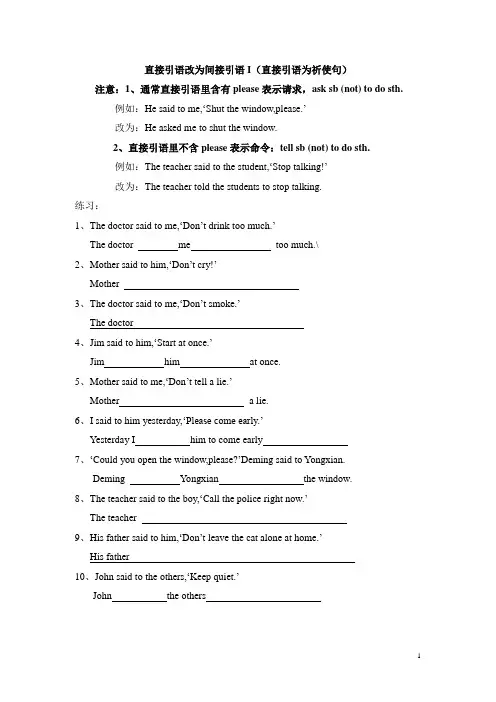
注意:1、通常直接引语里含有please表示请求,ask sb (not) to do sth.例如:He said to me,‘Shut the window,please.’改为:He asked me to shut the window.2、直接引语里不含please表示命令:tell sb (not) to do sth.例如:The teacher said to the student,‘Stop talking!’改为:The teacher told the students to stop talking.练习:1、The doctor said to me,‘Don’t drink too much.’The doctor me too much.\2、Mother said to him,‘Don’t cry!’Mother3、The doctor said to me,‘Don’t smoke.’The doctor4、Jim said to him,‘Start at once.’Jim him at once.5、Mother said to me,‘Don’t tell a lie.’Mother a lie.6、I said to him yesterday,‘Please come early.’Yesterday I him to come early7、‘Could you open the window,please?’Deming said to Yongxian.Deming Yongxian the window.8、The teacher said to the boy,‘Call the police right now.’The teacher9、His father said to him,‘Don’t leave the cat alone at home.’His father10、John said to the others,‘Keep quiet.’John the others注意:1、连词that引导2、人称的改变(一随主二随宾三不变)3、时态的变化(主句用现在时或将来时,从句可用任何时态;主句用过去时,从句用与过去相关的时态。
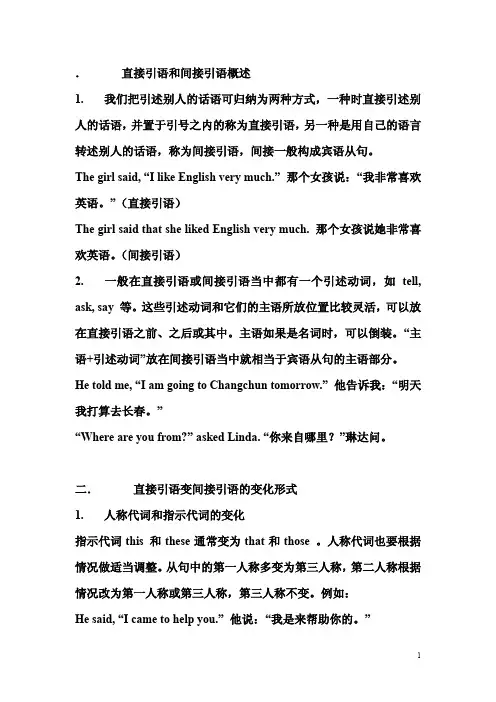
.直接引语和间接引语概述1. 我们把引述别人的话语可归纳为两种方式,一种时直接引述别人的话语,并置于引号之内的称为直接引语,另一种是用自己的语言转述别人的话语,称为间接引语,间接一般构成宾语从句。
The girl said, “I like English very much.” 那个女孩说:“我非常喜欢英语。
”(直接引语)The girl said that she liked English very much. 那个女孩说她非常喜欢英语。
(间接引语)2. 一般在直接引语或间接引语当中都有一个引述动词,如tell, ask, say 等。
这些引述动词和它们的主语所放位置比较灵活,可以放在直接引语之前、之后或其中。
主语如果是名词时,可以倒装。
“主语+引述动词”放在间接引语当中就相当于宾语从句的主语部分。
He told me, “I am going to Changchun tomorrow.” 他告诉我:“明天我打算去长春。
”“Where are you from?” asked Linda. “你来自哪里?”琳达问。
二.直接引语变间接引语的变化形式1. 人称代词和指示代词的变化指示代词this 和these通常变为that和those 。
人称代词也要根据情况做适当调整。
从句中的第一人称多变为第三人称,第二人称根据情况改为第一人称或第三人称,第三人称不变。
例如:He said, “I came to help you.” 他说:“我是来帮助你的。
”→He said that he had come to help me. 他说他是来帮助我的。
2. 时态的变化(1)引述动词如果用一般现在时或一般将来时,间接引语的时态不变。
(2)引述动词如果用一般过去时,间接引语的时态要变成相应的过去时态的一种。
具体变化如下:一般现在时→一般过去时一般过去时→过去完成时现在进行时→过去进行时现在完成时→过去完成时一般将来时→过去将来时【注意】(1)含有情态动词的直接引语变成间接引语是,情态动词也要相应地变成过去时态。
直接引语与间接引语的转换技巧在日常生活和学术写作中,我们经常会用到直接引语和间接引语来引述他人的话语或观点。
直接引语是将别人的原话直接引用,而间接引语是将别人的原话进行转述。
正确地使用直接引语和间接引语是写作中必不可少的技巧,本文将介绍一些转换技巧,并举例说明其正确应用。
一、直接引语的转换1. 改变人称和时态当将直接引语转换为间接引语时,要注意改变人称和时态。
一般来说,第一人称要转换为“第三人称”,现在时要转换为“过去时”。
例如,直接引语:“I love reading.”(我喜欢阅读。
)间接引语:“She said that she loved reading.”(她说她喜欢阅读。
)2. 改变时间和地点状语在转换为间接引语时,也要对时间和地点状语进行相应的改变。
例如,直接引语:“He said, 'I will go to the library tomorrow.'”(他说:“我明天会去图书馆。
”)间接引语:“He said that he would go to the library the next day.”(他说他会在第二天去图书馆。
)3. 注意连接词的变化在转换为间接引语时,需要注意连接词的变化。
例如,“I think”可以改为“I thought”或“he thought”。
例如,直接引语:“She said, 'I think it's a good idea.'”(她说:“我认为这是个好主意。
”)间接引语:“She said that she thought it was a good idea.”(她说她认为这是个好主意。
)二、间接引语的转换1. 恢复直接引语的原貌有时候,在间接引语中需要恢复原引语的直接引语形式。
例如,直接引语:“He told me, 'I will come tomorrow.'”(他告诉我:“我明天会来。
英语语法:直接引语变间接引语一、如何变人称;下面有一句顺口溜“一随主。
二随宾,第三人称不更新”。
“一随主”是指在直接引语变间接引语时,如果从句中的主语是第一人称或被第一人称所修饰。
从句中的人称要按照主句中主语的人称变化如:She said. "My brother wants to go with me." →She said her brother wanted to go with her.“二随宾”是指直接引语变间接引语时,若从句中的主语及宾语是第二人称。
或被第二人你所修饰。
从句中的人称要跟引号外的主句的宾语一致。
如果引号外的主句没有宾语。
也可以用第一人称,如:He said to Kate. "How is your sister now?" →He asked Kate how her sister was then。
“第三人称不更新”是指直接引语变间接引语时。
如果从句中的主语及宾语是第三人称或被第三人称所修饰从句中的人称一般不需要变化如:Mr. Smith said: "Jack is a good worker。
"→Mr. Smith said Jack was a good worker。
二、如何变时态:直接引语在改为间接引语时、时态需要做相应的调整。
现在时它需改为过去时态;过去时态改为完成时;过去完成时则保留原来的时态。
如:1) She said. "I have lost a pen." →She said she had lost a pen.2) She said. "We hope so." →She said they hoped so.3) She said. "He will go to see his friend。
"→She said he would go to see his friend。
直接引语变间接引语句型一、直接引语变间接引语是英语中常见的一种语法转换。
在直接引语中,我们引用了别人的原话或陈述,而在间接引语中,我们将这些原话或陈述改写为自己的话。
以下是几个例子:1. 直接引语:He said, "I am going to the store."间接引语:He said that he was going to the store.2. 直接引语:She said, "I have finished my homework."间接引语:She said that she had finished her homework.3. 直接引语:They said, "We will meet at the park."间接引语:They said that they would meet at the park.4. 直接引语:He said, "I love to play soccer."间接引语:He said that he loved to play soccer.5. 直接引语:She said, "I can't come to the party."间接引语:She said that she couldn't come to the party.6. 直接引语:They said, "We have already eaten dinner."间接引语:They said that they had already eaten dinner.7. 直接引语:He said, "I want to go on vacation."间接引语:He said that he wanted to go on vacation.8. 直接引语:She said, "I am not feeling well."间接引语:She said that she was not feeling well.9. 直接引语:They said, "We are going to the beach tomorrow."间接引语:They said that they were going to the beach tomorrow.10. 直接引语:He said, "I have never been to Europe."间接引语:He said that he had never been to Europe.二、通过将直接引语转换为间接引语,我们可以在叙述他人话语的同时保持句子的整体完整性。
9A Unit 6英语语法———直接引语变为间接引语(宾语从句)一、直接引语变成间接引语的几个例子:⑴The teacher told us, “The earth is round.”The teacher told us (that) the earth is round.(2)Tom said to me yesterday, “ I like reading books.”Tom told me yesterday (that) he likes reading books.⑶Lily told me, “ I want to go shopping.”Lily told me (that) she wanted to go shopping.※※※※※※※※※※※※※※※※※※※※※※※※※※※※※※※※※※※※※※※※(4) He asked me ,“who is the woman ?”He asked me who the woman was .(5) I asked Tom, “ Where does John live?“I asked Tom where John lived.※※※※※※※※※※※※※※※※※※※※※※※※※※※※※※※※※※※※※※※※(6)I asked Lucy, “Are you watching TV?”I asked Lucy if she was watching TV .(7)He asked me, “Do you have any paper?”He asked me if I had any paper.二、根据以上的例子归纳1.宾语从句定义:宾语从句是指在复合句中主句的宾语由一个完整的句子来充当,这个句子叫宾语从句。
2直接引语改为间接引语(宾语从句)的方法:(特别要注意时态、语序、人称变化三个方面...................)①陈述句作宾语从句常由that来引导,口语中that常省略)(如(1)(2)(3))②特殊疑问句作宾语从句常由特殊疑问词(who/what/where等)来引导,而且必须用陈述句语序。
.. .下载可编辑. 如何把直接引语转换为间接引语
引述别人的话时,一般采用两种方式:一是引用别人的原话,把它放在引号内,称为直接引语;二是用自己的话加以转述,被转述的话不放在引号内,称为间接引语。间接引语在大多数情况下是一个宾语从句。直接引语变成间接引语时,要注意以下几点:人称变化、时态变化、宾语从句要用陈述句语序。
1. 直接引语是陈述句,变成间接引语时,由连词that.... 引导,很多时候可省略that。例如: She said, "I am very happy to help you." She said she was very happy to help me. She said, “I will go to Guangzhou tomorrow.” She said that she would go to Guangzhou the next day/the following day. She said, “I have lived in Foshan for several years.” She said that she had lived in Foshan for several years. She said, “ I am reading a book now.” She said that she was reading a book at that time/moment. John said, “I am leaving for Paris on Wednesday” John said that he was leaving for Paris on Wednesday. 2. 直接引语是一般疑问句,变成间接引语时,由连词whether.......或if..(是否) 引导。先把直接引语变为陈述句语序,再放在whether或if后面。例如: He asked me, "Do you like playing football?" He asked me whether/if I liked playing football. He asked Mary, “Will you come to my birthday party?” .. .下载可编辑. You will come to my birthday party.
He asked Mary whether/if she would come to his birthday party. 注意:大多数情况下,if和whether 可以互换,但后有or not,或在动词不定式前,或放在介词后作连接词时,一般只用whether。例如:
She asked me whether he could do it or not. He hesitated about whether to drive or take the train. 3. 直接引语是特殊疑问句,变成间接引语时,由相应的疑问词who, whom, whose, how, when, why, where 等引导,先把直接引语(去掉特殊疑问词后)变为陈述句语序,再放回特殊疑问词后进行相应的变化。例如:
My sister asked me, "How do you like the film?” You like the film My sister asked me how I liked the film. John asked Mary, “Where shall we go?” John asked Mary where they should go. John asked Mary, “When shall we leave for Paris?” John asked Mary when they should leave for Paris. 1. Franco asked me, “Is the food ready?” Franco asked me whether/if the food was ready. 2. Phillip asked Lily, “Are the young couple drinking red or white wine?” the young couple are drinking red or white wine. Phillip asked Lily whether/if the young couple were drinking red or white wine.
3. He asked, “Who is working in the restaurant?” .. .下载可编辑. He asked who was working in the restaurant.
4. Linda asked, “When will the restaurant be ready?” The restaurant will be ready. Linda asked when the restaurant would be ready. 5. She asked me, “Will you do me a favor?” You will do me a favor. She asked me whether/if I would do her a favor. 6. John said, “I think I will have to take his advice.” John said that he thought he would have to take his advice. 7. She asked Jack, “What problems have you had this evening?” you have had problems this evening. She asked Jack what problems he had had that evening. 8. Susan asked, “Can I talk to the guests?” I can talk to the guests. Susan asked whether/if she could talk to the guests. 4. 直接引语是祈使句,变成间接引语时,把动词原形变成动词不定式,并在动词不定前加tell, ask, order 等的宾语。例如:
A. ask/tell sb to do sth. B. ask/tell sb not to do sth. The captain ordered, "Be quiet." The captain ordered us/them/the soldiers to be quiet. He said to Sue, “Marry me.” .. .下载可编辑. He asked Sue to marry him.
Peter told John, “Get out!” Peter told John to get out. 注意:此种情况的否定句,在动词不定式前加not。 My teacher asked me, "Don't laugh.” My teacher asked me not to laugh. He said to her, “Don’t dance in the toilet bowl.” He asked her not to dance in the toilet bowl. 5. 一些注意事项 (1)直接引语是客观事实、普遍真理等,变成间接引语时,时态不变。例如: They told their son, "The earth goes round the sun." They told their son that the earth goes round the sun. 我爷爷告诉我,共产党(Communist Party)的宗旨(gist)是为人民服务。 My grandfather told me that the gist of the Communist Party is to serve the people. (2)直接引语变间接引语时, 指示代词、时间状语、地点状语等要作相应的变化。如:this/these that/those, nowthen, todaythat day, yesterdaythe day before, last yearthe year before, agobefore, herethere等。例如:
My wife said to me, “I will bring my new lover home this evening.” My wife said to me that she would bring her new lover home that evening. He said, "I haven't seen her today." He said that he hadn’t seen her that day. He shouted to me, “Fuck/Piss off!” .. .下载可编辑. He asked me loudly/angrily to fuck/piss off.
He said to Ivy, “Please don’t leave me.” He asked/told Ivy not to leave him.
He begged Ivy not to leave him. Linda asked Kathy, “Will you be there tomorrow?” You will be there tomorrow. Linda asked Kathy whether/if she would be there the next/following day. Kevin asked Cecilia, “Do you know how much I miss you?” you know how much I miss you. Kevin asked Cecilia whether/if she knew how much he missed her. Kevin asked Cecilia, “When will I see you again?” I will see you again. Kevin asked Cecilia when he would see her again. 注意:如果转述时就在原来的地方,就在说话的当天,就不必改变指示代词、时间状语、地点状语等。